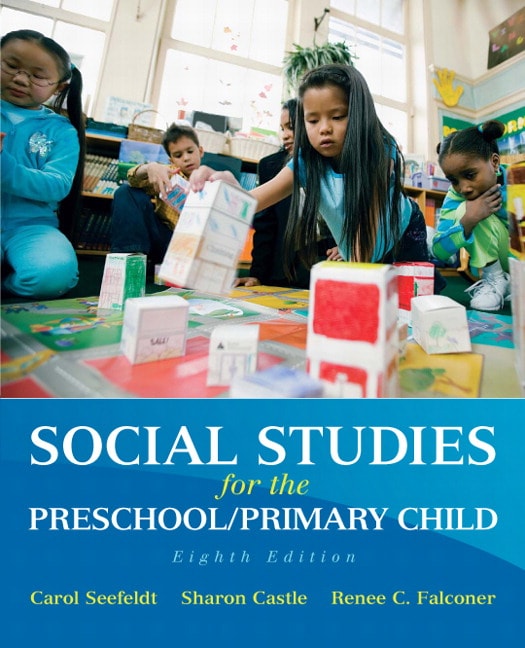
30.00$ - Purchase this E-book
Category : Higher Education
Part ONE Planning for the Social Studies Chapter 1 These Are the Social Studies Past Approaches to the Social Studies Progressive Education and the Here-and-Now Curriculum Social-Living Curriculum Holiday Curriculum Social Forces and Theories Affecting the Curriculum Social Studies Today Active Learning Integrated Meaningful Of High Interest Standards for Knowledge, Skills and Attitudes Scope and Sequence Curriculum Models for Early Childhood Education Summary Extend Your Knowledge Resources Chapter 2 Planning and Assessment Knowledge of Children Children Are Alike So Alike, So Different Special Needs Knowledge of the Community The Child’s Physical World Cultural Knowledge and Values Knowledge of the Social Studies Short- and Long-Term Planning Involving the Children Planning for the Spontaneous Lesson Plans Units, Projects and Thematic Learning Assessment of the Social Studies Curriculum Observation Portfolios Informal Interviews Performance Interviews Checklists Standardized Tests Summary Extend Your Knowledge Resources Chapter 3 Resources for Learning The Children The Family Informal Involvement Formal Involvement The School THE COMMUNITY Field Work Guest Speakers Community Service The Classroom Deciding on Learning Centers Introducing Centers Types of Centers Vicarious Materials in the Classroom Summary Extend Your Knowledge Resources Part TWO The Processes of Social Studies Chapter 4 Thinking and Concept Formation Planning Thinking Experiences Firsthand Experiences Experiences Involving Others Experiences Requiring Language Fostering Thinking Processes Questioning and Sensing Problems Locating Information: Field Trips Organizing and Interpreting Information Seeing Relationships and Beginning to Generalize Interpreting, Reflecting and Reaching Conclusions Concept Formation Key Concepts Concept Development Nurturing Concept Formation The Problem of the Match Guidelines for Concept Formation Summary Extend Your Knowledge Resources Chapter 5 Self, Others and the Community: Social Skills Social Skills Develop Theories of Socialization Behavioral Theories Erikson’s Theory Social-Cognitive Theories Factors Affecting Social Development The Family Role Culture Role of the School Self-Concept General Identity: Names The Physical Self Self-Efficacy Assessing Self-Concept, Self-Esteem and Self-Efficacy Relating to Others Communicating Sharing Cooperating Making and Having Friends Conflict Resolution Summary Extend Your Knowledge Resources Chapter 6 Culture, Diversity and Values CULTURE DIVERSITY WHAT ARE YOUR ATTITUDES? How Children Learn ABOUT OTHERS KEY CONCEPTS ATTITUDES AND VALUES HOW CHILDREN LEARN VALUES Modeling Reinforcement Learning Which Theory? Indoctrination Value Clarification Value Analysis What Values Should Be Taught? Encouraging Anti-Bias Values in the Classroom Teaching Peace, Understanding War Summary Extend Your Knowledge Resources Part THREE The Content of the Social Studies Chapter 7 Children’s Study of Time, Continuity, and Change: History Key Concepts History Science, Technology and Society Time Development of Time Concepts Routines That Teach Time Measuring Time The Passage of Time Change In School In the Neighborhood or Community In Nature In Children The Continuity of Human Life The Family Intergenerational Contacts Holiday Celebrations and Traditions Cultural Universals The Past People Objects and Visual Discovery Narratives and the Arts Methods of the Historian Summary Extend Your Knowledge Resources Chapter 8 People, Places and Environments: Geography Key Concepts The Earth Is the Place Where We Live Our Environment Land and Water Caring for Our Earth A Nearly Round Sphere in a Solar System Direction and Location Movement Exploration Directional Terms Distance and Measurement Maps and Globes Relationships Within Places Spatial Interactions Regions Physical Regions Cultural Regions Summary Extend Your Knowledge Resources Chapter 9 Production, Distribution and Consumption: Economics Development of Economic Concepts Key Concepts Scarcity Economic Production Preparing for Careers Summary Extend Your Knowledge Resources Chapter 10 Developing Citizenship: Civics and Government Key Concepts Democratic Values Civic participation Political Concepts Research Voting Symbols of Democratic Government Ownership and Pride School and Community Summary Extend Your Knowledge Resources Chapter 11 Global Connections Key Concepts Interconnectedness and Interdependency Similarities Resources for Learning about Others Global Education Summary Extend Your Knowledge Resources References Index Table of Contents
Get Social Studies for the Preschool/Primary Child, 8th Edition by Carol Seefeldt, University of Maryland Sharon D. Castle, George Mason University Renee D. Falconer, George Mason University


0 commentaires:
Enregistrer un commentaire